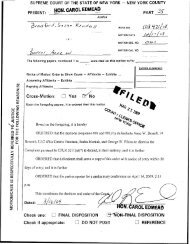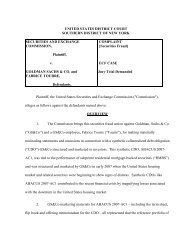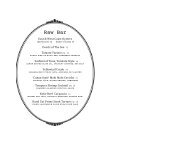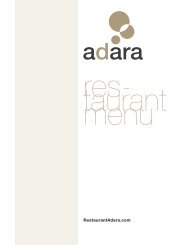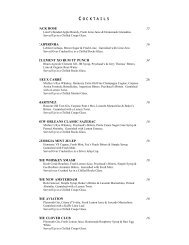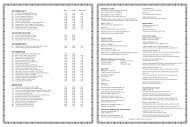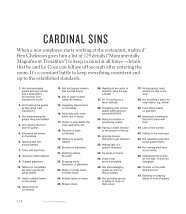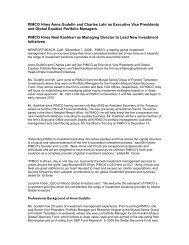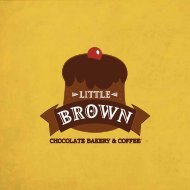- Page 1 and 2: Case 1:09-cv-21893-WMH Document 16
- Page 3 and 4: Case 1:09-cv-21893-WMH Document 16
- Page 5 and 6: Case 1:09-cv-21893-WMH Document 16
- Page 7 and 8: Case 1:09-cv-21893-WMH Document 16
- Page 9 and 10: Case 1:09-cv-21893-WMH Document 16
- Page 11 and 12: Case 1:09-cv-21893-WMH Document 16
- Page 13 and 14: Case 1:09-cv-21893-WMH Document 16
- Page 15: Case 1:09-cv-21893-WMH Document 16
- Page 19 and 20: Case 1:09-cv-21893-WMH Document 16
- Page 21 and 22: Case 1:09-cv-21893-WMH Document 16
- Page 23 and 24: Case 1:09-cv-21893-WMH Document 16
- Page 25 and 26: Case 1:09-cv-21893-WMH Document 16-
- Page 27 and 28: Case 1:09-cv-21893-WMH Document 16-
- Page 29 and 30: Trademark Electronic Search System
- Page 31 and 32: Trademark Electronic Search System
- Page 33 and 34: Trademark Electronic Search System
- Page 35 and 36: Trademark Electronic Search System
- Page 37 and 38: Trademark Electronic Search System
- Page 39 and 40: Trademark Electronic Search System
- Page 41 and 42: Trademark Electronic Search System
- Page 43 and 44: Trademark Electronic Search System
- Page 45 and 46: Trademark Electronic Search System
- Page 47 and 48: Trademark Electronic Search System
- Page 49 and 50: Trademark Electronic Search System
- Page 51 and 52: Trademark Electronic Search System
- Page 53 and 54: Trademark Electronic Search System
- Page 55 and 56: Trademark Electronic Search System
- Page 57 and 58: Trademark Electronic Search System
- Page 59 and 60: Trademark Electronic Search System
- Page 61 and 62: Trademark Electronic Search System
- Page 63 and 64: Trademark Electronic Search System
- Page 65 and 66: Trademark Electronic Search System
- Page 67 and 68:
Trademark Electronic Search System
- Page 69 and 70:
Trademark Electronic Search System
- Page 71 and 72:
Trademark Electronic Search System
- Page 73 and 74:
Trademark Electronic Search System
- Page 75 and 76:
Trademark Electronic Search System
- Page 77 and 78:
Trademark Electronic Search System
- Page 79 and 80:
Trademark Electronic Search System
- Page 81 and 82:
Trademark Electronic Search System
- Page 83 and 84:
Trademark Electronic Search System
- Page 85 and 86:
Trademark Electronic Search System
- Page 87 and 88:
Trademark Electronic Search System
- Page 89 and 90:
Trademark Electronic Search System
- Page 91 and 92:
Trademark Electronic Search System
- Page 93 and 94:
Trademark Electronic Search System
- Page 95 and 96:
Trademark Electronic Search System
- Page 97 and 98:
Trademark Electronic Search System
- Page 99 and 100:
Trademark Electronic Search System
- Page 101 and 102:
Trademark Electronic Search System
- Page 103 and 104:
Trademark Electronic Search System
- Page 105 and 106:
Trademark Electronic Search System
- Page 107 and 108:
Trademark Electronic Search System
- Page 109 and 110:
Trademark Electronic Search System
- Page 111 and 112:
Trademark Electronic Search System
- Page 113 and 114:
Trademark Electronic Search System
- Page 115 and 116:
Trademark Electronic Search System
- Page 117 and 118:
Trademark Electronic Search System
- Page 119 and 120:
Trademark Electronic Search System
- Page 121 and 122:
Trademark Electronic Search System
- Page 123 and 124:
Trademark Electronic Search System
- Page 125 and 126:
Trademark Electronic Search System
- Page 127 and 128:
Trademark Electronic Search System
- Page 129 and 130:
Trademark Electronic Search System
- Page 131 and 132:
Trademark Electronic Search System
- Page 133 and 134:
Trademark Electronic Search System
- Page 135 and 136:
Trademark Electronic Search System
- Page 137 and 138:
Trademark Electronic Search System
- Page 139 and 140:
Trademark Electronic Search System
- Page 141 and 142:
Trademark Electronic Search System
- Page 143 and 144:
Trademark Electronic Search System
- Page 145 and 146:
CHINESE CHOW NEW YORK - Google Maps
- Page 147 and 148:
CHINESE CHOW NEW YORK - Google Maps
- Page 149 and 150:
CHINESE CHOW NEW YORK - Google Maps
- Page 151 and 152:
CHINESE CHOW NEW YORK - Google Maps
- Page 153 and 154:
CHINESE CHOW NEW YORK - Google Maps
- Page 155 and 156:
CHINESE CHOW NEW YORK - Google Maps
- Page 157 and 158:
CHINESE CHOW LOS ANGELES - Google M
- Page 159 and 160:
CHINESE CHOW NEW YORK - Google Maps
- Page 161 and 162:
CHINESE CHOW LOS ANGELES - Google M
- Page 163 and 164:
CHINESE CHOW NEW YORK - Google Maps
- Page 165 and 166:
CHINESE CHOW NEW YORK - Google Maps
- Page 167 and 168:
CHINESE CHOW NEW YORK - Google Maps
- Page 169 and 170:
CHINESE CHOW NEW YORK - Google Maps
- Page 171 and 172:
CHINESE CHOW LOS ANGELES - Google M
- Page 173 and 174:
CHINESE CHOW LOS ANGELES - Google M
- Page 175 and 176:
CHINESE CHOW LOS ANGELES - Google M
- Page 177 and 178:
CHINESE CHOW LOS ANGELES - Google M
- Page 179 and 180:
CHINESE CHOW LOS ANGELES - Google M
- Page 181 and 182:
EXHIBIT D
- Page 183 and 184:
Entity Information Case 1:09-cv-218
- Page 185 and 186:
Entity Information Case 1:09-cv-218
- Page 187 and 188:
Entity Information Case 1:09-cv-218
- Page 189 and 190:
Entity Information Case 1:09-cv-218
- Page 191 and 192:
Entity Information Case 1:09-cv-218
- Page 193 and 194:
Entity Information Case 1:09-cv-218
- Page 195 and 196:
Entity Information Case 1:09-cv-218
- Page 197 and 198:
Entity Information Case 1:09-cv-218
- Page 199 and 200:
Entity Information Case 1:09-cv-218
- Page 201 and 202:
Entity Information Case 1:09-cv-218
- Page 203 and 204:
Entity Information Case 1:09-cv-218
- Page 205 and 206:
Entity Information Case 1:09-cv-218
- Page 207 and 208:
Entity Information Case 1:09-cv-218
- Page 209 and 210:
Entity Information Case 1:09-cv-218
- Page 211 and 212:
Entity Information Case 1:09-cv-218
- Page 213 and 214:
Entity Information Case 1:09-cv-218
- Page 215 and 216:
Entity Information Case 1:09-cv-218
- Page 217 and 218:
Entity Information Case 1:09-cv-218
- Page 219 and 220:
Entity Information Case 1:09-cv-218
- Page 221 and 222:
Entity Information Case 1:09-cv-218
- Page 223 and 224:
Entity Information Case 1:09-cv-218
- Page 225 and 226:
Entity Information Case 1:09-cv-218
- Page 227 and 228:
Entity Information Case 1:09-cv-218
- Page 229 and 230:
Entity Information Case 1:09-cv-218
- Page 231 and 232:
Entity Information Case 1:09-cv-218
- Page 233 and 234:
Entity Information Case 1:09-cv-218
- Page 235 and 236:
Entity Information Case 1:09-cv-218
- Page 237 and 238:
Entity Information Case 1:09-cv-218
- Page 239 and 240:
Entity Information Case 1:09-cv-218
- Page 241 and 242:
Entity Information Case 1:09-cv-218
- Page 243 and 244:
Entity Information Case 1:09-cv-218
- Page 245 and 246:
Entity Information Case 1:09-cv-218
- Page 247 and 248:
Entity Information Case 1:09-cv-218
- Page 249 and 250:
Entity Information Case 1:09-cv-218
- Page 251 and 252:
Entity Information Case 1:09-cv-218
- Page 253 and 254:
Entity Information Case 1:09-cv-218
- Page 255 and 256:
Entity Information Case 1:09-cv-218
- Page 257 and 258:
Entity Information Case 1:09-cv-218
- Page 259 and 260:
Entity Information Case 1:09-cv-218
- Page 261 and 262:
Entity Information Case 1:09-cv-218
- Page 263 and 264:
Entity Information Case 1:09-cv-218
- Page 265 and 266:
California Business Search Case 1:0
- Page 267 and 268:
California Business Search Page 1 o
- Page 269 and 270:
California Business Search Page 1 o
- Page 271 and 272:
California Business Search Page 1 o
- Page 273 and 274:
California Business Search Page 1 o
- Page 275 and 276:
California Business Search Case 1:0
- Page 277 and 278:
California Business Search Page 1 o
- Page 279 and 280:
California Business Search Page 1 o
- Page 281 and 282:
California Business Search Case 1:0
- Page 283 and 284:
California Business Search Page 1 o
- Page 285 and 286:
California Business Search Page 1 o
- Page 287 and 288:
California Business Search Page 1 o
- Page 289 and 290:
California Business Search Page 1 o
- Page 291 and 292:
California Business Search Page 1 o
- Page 293 and 294:
California Business Search Page 1 o
- Page 295 and 296:
California Secretary of State - Cal
- Page 297 and 298:
California Business Search Page 1 o
- Page 299 and 300:
California Secretary of State - Cal
- Page 301 and 302:
California Secretary of State - Cal
- Page 303 and 304:
California Business Search Page 1 o
- Page 305 and 306:
California Business Search Case 1:0
- Page 307 and 308:
California Business Search Page 1 o
- Page 309 and 310:
California Business Search Case 1:0
- Page 311 and 312:
www.sunbiz.org - Department of Stat
- Page 313 and 314:
www.sunbiz.org - Department of Stat
- Page 315 and 316:
www.sunbiz.org - Department of Stat
- Page 317 and 318:
www.sunbiz.org - Department of Stat
- Page 319 and 320:
www.sunbiz.org - Department of Stat
- Page 321 and 322:
www.sunbiz.org - Department of Stat
- Page 323 and 324:
www.sunbiz.org - Department of Stat
- Page 325 and 326:
EXHIBIT E
- Page 327 and 328:
Trademark Electronic Search System
- Page 329 and 330:
Trademark Electronic Search System
- Page 331 and 332:
EXHIBIT F
- Page 333 and 334:
Case 1:09-cv-21893-WMH Document 16-
- Page 335 and 336:
Case 1:09-cv-21893-WMH Document 16-
- Page 337 and 338:
EXHIBIT G
- Page 339 and 340:
Case 1:09-cv-21893-WMH Document 16-



